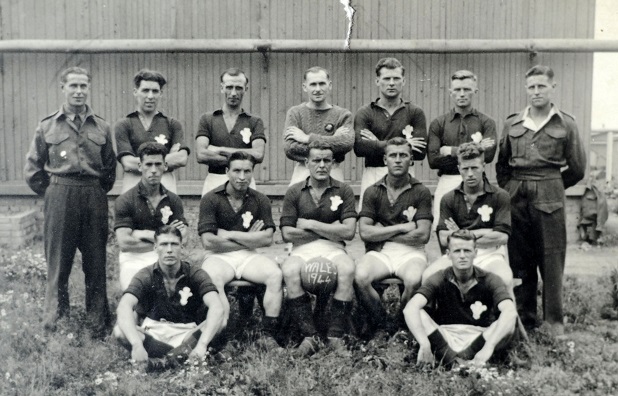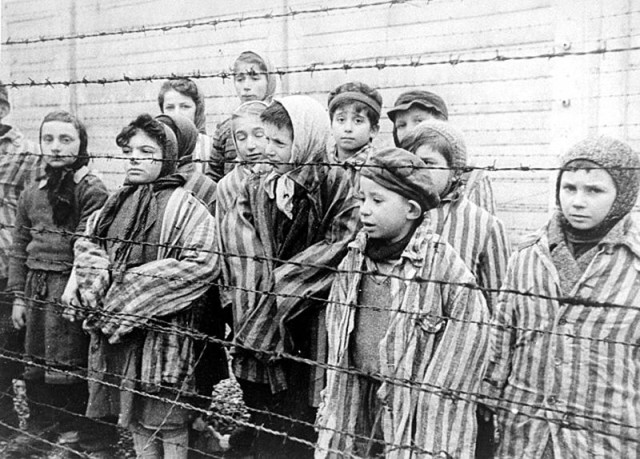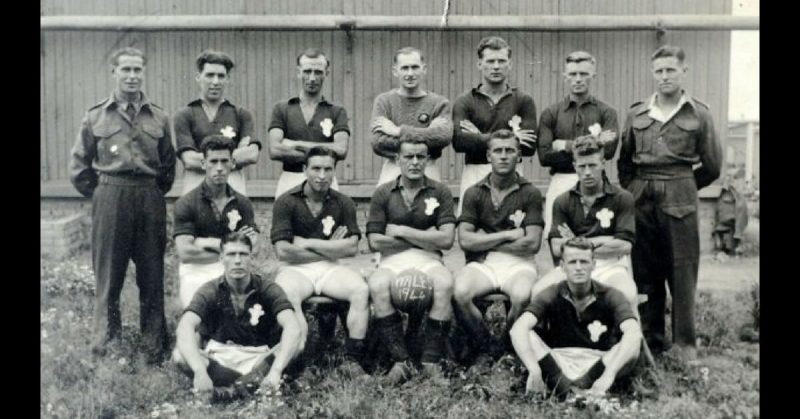Ron Jones was 23 when he became a POW in North Africa in 1942. He recalls the moment of his capture very well ― he was sent on a patrol, along with his fellow soldiers from the 1st Battalion Welsh Regiment, when all of a sudden, a Tiger tank appeared in the desert, like a mirage. The German tank commander opened the hatch and pronounced in perfect English: “Put down your guns, boys. For you, the war is over”.
From this moment on, Jones’ Golgotha began. He was sent to Italy, to a POW camp. One day, an Italian interpreter asked around, if there were some skilled engineers among the prisoners. Thinking he would benefit from a job, Ron Jones, who was nicknamed Taffy by fellow prisoners, volunteered.
Before the war, Jones worked for a steel company, so he saw the opportunity to earn food for himself and his comrades, for the POWs were fed scarcely. Instead, he ended up on a cattle train that was headed to Poland.
Jones claims in his testimony that weeks had passed until they realized their location. It was Auschwitz. A small contingent of British POWs was stationed in the Stalag VIIIB, right next to the infamous death camp. This was where he learned about the gas chambers and the horrible treatment that the Jews were subjected to.
One of the first things he saw in the camp was a German soldier who shot two people in front of him. Jones was terrified, and he asked the soldier, why? The guard answered with an ordinary tone: “They are only Jews.” Stories of the gas chambers and crematoria started to haunt the young Welshman.

“We did not know what would happen to us. We thought at one time they would stick us in the gas chamber,” Ron said during an interview with the Daily Mail.
In referring to the furnaces used by the Germans to get rid of the bodies, Jones said:
“The first thing you’d notice was the smell; if the wind was in your direction the smell was terrible. We were always frightened we would be next.”
Fortunately, the Red Cross was inspecting the POWs conditions almost regularly. Later, in his interviews, Ron Jones would often point out how the Allied prisoners of war received far better treatment than the other inmates, among whom were the Jews, the Roma and even political prisoners and homosexuals. Apart from several incidents, the Allied prisoners were treated decently.
The Red Cross began to deliver food and other goods to the POWs, and they decided to aid the starving Jews, even though any contact with them was prohibited. On one occasion, Ron Jones gave a sausage to a Jewish man called Joseph. Out of gratitude, Joseph gave Ron a ring he had made out of an old pipe. The ring is still on the Welshman’s finger, as a reminder of those who didn’t survive, including Joseph who was gassed soon after this encounter.

For the Brits, on the other hand, it wasn’t all that bad. They worked from Monday to Saturday, but on Sunday they had a day off. So they invented the Auschwitz Football League. When the Red Cross found out about it, they delivered football uniforms to the prisoners. There were English, Scotish, Welsh and Irish jerseys, so the league started to look like the real thing.
Jones was appointed goalkeeper of the Welsh team. Since his mother was a tailor, he sewed a Prince of Wales feather emblem to each of his player’s socks, thus making the Welsh team look even more convincing. The Germans allowed this sort of recreation among the POWs and even enjoyed watching the games themselves.
“When you’re under those conditions it was a real pleasure to play football on a Sunday,” Jones said, adding, “but we could only play in the summer, of course, because in the winter it was deep with snow.”
By 1944, Jones and his mates had a small radio stashed in their barracks and they were aware that the Allies were already in France. More importantly, they knew about the Soviet offensive which was pushing towards Poland. Soon they would hear gunshots and artillery in the distance. Battles were lighting the night sky, as they became more and more certain that the liberation was soon to come. But then, the Germans started organizing a horrible death march for the POWs, while the remaining Jews and other non-military prisoners were annihilated at a rapid rate.
Ron Jones and 230 other Allied prisoners marched 900 miles from Poland into Czechoslovakia, and finally to Austria, where they were liberated by the Americans. But the death march took its toll ― less than 150 men survived it, and Taffy Jones was one of them. He saw his friends fall to exhaustion along the way, where they were left to die. His boots fell apart, so he walked with sacks on his feet. Since the Nazis refused to feed the prisoners, they were starving, eating only what they could find along the way. Jones recalls kicking a pig once, just to get to the potatoes the pig was eating.
When he was freed, the goalkeeper of Auschwitz was in a dire state himself. He lost half of his weight, and his body was covered with boils and blisters, infected surface wounds, fleas, and lice. The US soldiers gave him a uniform, and he was sent to France, together with his surviving comrades. From there, he traveled back to Bassaleg in Newport, Wales.
After the war, Jones had difficulties adjusting, as he experienced nightmares, nerve problems, and paranoia. Today, he often speaks of his late wife Gwladys, who stood by him all the time, helping him overcome the traumas of his prison days. Eventually, he recovered.
Today, Ron Jones is a 99-year-old widower and has a son. He wrote a book in 2013, titled The Auschwitz Goalkeeper, in which he vividly described his experience. That year he visited Auschwitz once again, which brought back painful memories.
Ron Jones holds occasional lectures at schools all over Wales even today, in which he explains the terrible history of the Holocaust.
